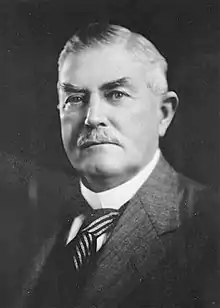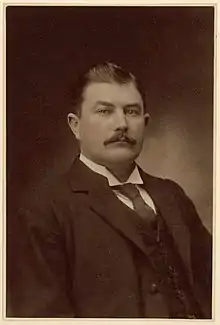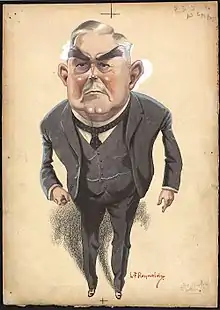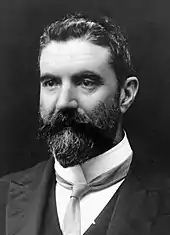George Fuller (Australian politician)
Sir George Warburton Fuller KCMG (22 January 1861 – 22 July 1940) was an Australian politician who served as the 22nd Premier of New South Wales, in office from 1922 to 1925 and for one day in December 1921. He previously served in the federal House of Representatives from 1901 to 1913, representing the Division of Illawarra, and was Minister for Home Affairs under Alfred Deakin from 1909 to 1910.
Sir George Fuller | |
|---|---|
 | |
| 22nd Premier of New South Wales Elections: 1922, 1925 | |
| In office 13 April 1922 – 17 June 1925 | |
| Governor | Walter Edward Davidson Dudley de Chair |
| Preceded by | James Dooley |
| Succeeded by | Jack Lang |
| In office 20 December 1921 – 20 December 1921 | |
| Governor | Walter Edward Davidson |
| Preceded by | James Dooley |
| Succeeded by | James Dooley |
| Federal Minister for Home Affairs | |
| In office 2 June 1909 – 29 April 1910 | |
| Prime Minister | Alfred Deakin |
| Preceded by | Hugh Mahon |
| Succeeded by | King O'Malley |
| Member of the Australian Parliament for Illawarra | |
| In office 30 March 1901 – 31 May 1913 | |
| Preceded by | New seat |
| Succeeded by | George Burns |
| Member of the New South Wales Legislative Assembly | |
| In office 16 September 1915 – 7 February 1928 | |
| Preceded by | Frank Badgery |
| Succeeded by | Mark Morton |
| Constituency | Wollondilly |
| In office 9 February 1889 – 25 June 1894 | |
| Preceded by | Frank Badgery |
| Succeeded by | Mark Morton |
| Constituency | Kiama |
| Personal details | |
| Born | 22 January 1861 Kiama, New South Wales, Australia |
| Died | 22 July 1940 (aged 79) Darlinghurst, New South Wales, Australia |
| Political party | Anti-Socialist (1901–1909) Commonwealth Liberal (1909–1913) Liberal Reform (1915–1917) Nationalist (from 1917) |
| Spouse(s) | Ada Louisa King (m. 1892) |
| Education | Sydney Grammar School University of Sydney |
| Profession | Lawyer |
Early life
Fuller was born in Kiama, New South Wales and was educated at Kiama Public School, Sydney Grammar School and at St Andrew's College at the University of Sydney. He received a Bachelor of Arts (Hons) in 1879, and a Master of Arts in 1882 from the University of Sydney. He studied law under Sir William Patrick Manning (eminent judge and university chancellor) and became a barrister in 1884.[1]
Colonial politics
Fuller served in the New South Wales Legislative Assembly for over 18 years. Initially he represented Kiama from 1889 to 1894, but was defeated in 1894 and again in 1898.[2]
Federal politics

Fuller was the first member for Illawarra in the new Australian House of Representatives between 1901 and 1913. He was Minister for Home Affairs in 1909 and 1910 in Alfred Deakin's Commonwealth Liberal Party government and was responsible for making Canberra the national capital. In 1911 he was an Australian representative at the coronation of George V.[2]
State politics
From 1915 to 1928 Fuller represented Wollondilly for the Liberal Party and, from 1916, the Nationalist Party. In the part of 1916 and 1917, he was a leader of New South Wales' Nationalist Party and he became Colonial Secretary (the second most important cabinet position) in 1916. In 1917 his heavy-handed handling of a strike by rail and tramway workers against the introduction of time cards antagonised the unions and led to a general strike. His promise of higher pay and improved seniority benefits to workers returning to work split the rail unions for most of the twentieth century and the different employment conditions lasted until the Lang Government was elected. His action was seen by supporters as the decisive leadership required in wartime. In 1919, he expanded the state-owned fishing trawler fleet "to provide cheap fish for the mass of the population".[2] On 3 June 1919, he was appointed as a Knight Commander of the Order of St Michael and St George for his service as Colonial Secretary.[3]
Premier

Labor won the 1920 election and Fuller became Leader of the Opposition. In 1921 he took advantage of the death of John Storey to defeat James Dooley's Government on a motion of no confidence and as a result was asked to form a government. But Fuller himself had to give up the Premiership after only seven hours, after losing another motion of no confidence and Dooley returned to office.[2] In the 1922 state election, Dooley was defeated and Fuller became Premier once again. His government began the construction of the Sydney Harbour Bridge. This time his tenure lasted till the 1925 state election, won by Labor's Jack Lang.
Later years
Shortly after Lang's victory, Fuller resigned from the Nationalist leadership in favour of Thomas Bavin. From 1928 to 1931 he was the state's Agent-General in London. He died in the Sydney suburb of Darlinghurst.[2]
References
- "Sir George Warburton Fuller (1861–1940)". Former Members of the Parliament of New South Wales. Retrieved 11 May 2019.
- Ward, John M. (2006). "Fuller, Sir George Warburton (1861–1940)". Australian Dictionary of Biography. Melbourne University Press. ISSN 1833-7538. Retrieved 30 November 2019 – via National Centre of Biography, Australian National University.
- "Knight Commander of the Order of St Michael and St George (Imperial) entry for Hon George Warburton Fuller". It's an Honour, Australian Honours Database. Canberra, Australia: Department of the Prime Minister and Cabinet. 3 June 1919. Retrieved 30 November 2019.
Colonial Secretary of New South Wales
| New South Wales Legislative Assembly | ||
|---|---|---|
| Preceded by Angus Cameron |
Member for Kiama 1889 – 1894 |
Succeeded by Alexander Campbell |
| Parliament of Australia | ||
| New division | Member for Illawarra 1901 – 1913 |
Succeeded by George Burns |
| Political offices | ||
| Preceded by Hugh Mahon |
Minister for Home Affairs 1909 – 1910 |
Succeeded by King O'Malley |
| New South Wales Legislative Assembly | ||
| Preceded by Frank Badgery |
Member for Wollondilly 1915 – 1928 |
Succeeded by Mark Morton |
| Political offices | ||
| Preceded by George Black |
Colonial Secretary of New South Wales 1916 – 1920 |
Succeeded by James Dooley |
| Preceded by David Hall |
Vice-President of the Executive Council 1920 |
Succeeded by Edward Kavanagh |
| Preceded by James Dooley |
Premier of New South Wales 1921 |
Succeeded by James Dooley |
| Premier of New South Wales 1922 – 1925 |
Succeeded by Jack Lang | |
| Preceded by Sir Arthur Cocks |
Colonial Treasurer of New South Wales 1925 | |
| Diplomatic posts | ||
| Preceded by Viscount Chelmsford |
Agent-General for New South Wales 1928 – 1931 |
Succeeded by Albert Charles Willis |
